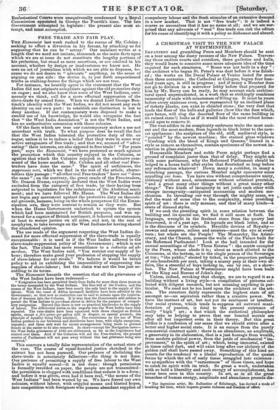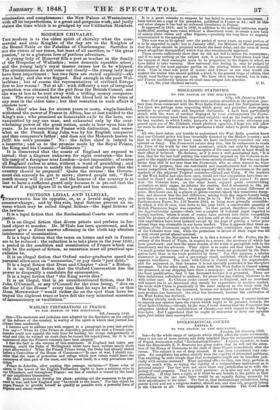A CHRISTMAS VISIT TO THE NEW PALACE AT WESTMINSTER.
IMPATIENT and grumbling Peers and Members should be sent on a tour among the dusty recesses of the New Palace. Travers.. ing those endless courts and corridors, those galleries and halls, they would learn to conceive some more adequate idea of the time required for such structures. "Rome was not built in a day " : the architect who began St. Peter's was dust before it was finish- ed; the works on the Ducal Palace at Venice lasted for more than three centuries ; the Cathedral at Cologne, begun four hun- dred years ago, o is still in progress and if many a Member does not go to division in a narrower lobby before that prepared for him by Mr. Barry can be ready, he may account such architec- tural speed unprecedented, in a work that so strikingly combines immensity of scale with minuteness of filling up. It must be years before every staircase even, now repreaented by an inclined plane of rickety planks, can exist in chiseled stone; the very dust that loads the floor of the halls and galleries (how like the dust which, ages hence will doe- the deserted floor of the same building in
its ruined hence, leas as if it would take the most robust house- maid ages to remove it. The vast edifice in its complexity embraces traits the most anci- ent and the most modern, from legends in black letter to the new- est appliances : the sculpture of the old, stiff, mediesval style, is "pointed" by the newest machine; the stained glass windows "blushing with the blood of Kings and Queens," limned in a style as remote as themselves, contain specimens of newest in- vention in glass-staining.* Honourable Members and noble Peers might perhaps find a ground of complaint juster than that of delay. They might ask with some pertinence, why the Reformed Parliament should be lodged in a house built after styles that flourished so long before any reformation whatever? Down many a corridor, in many a branching passage, the curious Member might encounter some appalling cui bono. You have size without comprehensive unity, intricacy without need, minuteness without artistical precision, "and a great many other things without a great many other things." Two kinds of incapacity in art jostle each other with strange incongruity—antiquated mannerism and modern me- chanism. In threading our way through the mighty maze, we feel the want of some clue to the complexity, some presiding spirit of art : there is only manner, and that of many kinds—a cento of disused styles.
If we seek the presiding spirit in some relation between the building and its special use, we find it still more at fault. Its language, wrought in the freshest stone from the quarry last discovered, is of a past age. Its legends are black letter, and so is the discourse of its symbols. Heraldic devices of Royalty— crowns and sceptres, mitres and crosiers—meet the eye at every turn ; but where are the People? The Monarchy, the Aristo- cracy, and the Church, possess the walls of the Palace built for the Reformed Parliament ! Look at the hall intended for the annual assemblage of the "Three Estates " : the centee occupied by the Peers, whose abode it is ; about as much allotted to the Commons, at the bottom, as to the single person of the Sovereign at top ; "the public," elected by ticket, in the proportion perhaps of one-hundredth per cent, taking a scanty peep at their own af- fairs, like a streetful of boys looking in, one by one, at a show- box. The New Palace at Westminster might have been built for the King and Barons of John's day.
Unless, indeed, revoking that charge, we are to regard it as a building without a living style—a compilation of patterns col- lected with diligent research, but not meaning anything in par- ticular. We need not be too hard upon the architect or the art- ists. The structure fairly represents the highest state of art amongst us—an aspiration rather than a creative power. We have the instinct of art, but not yet its sentiment or intellect. Our social system, which tends to suppress all outward mani- festation of passion, is fatal to the, present existence of really "high" art ; a fact which the eesthetical philosopher may take as helping to prove that our boasted morals are after all but imperfect even in their theory. But this great edifice is a confession of our sense that we should strive after a better and higher social state. It is an escape from the purely commercial contract spirit : there is an abundance, an amplitude, a generosity in its elaboration, that is a just homage from wealth, from modern politicalpower, from the pride of mechanical "im- provement," to the spirit of art ; which, being immortal, existed in times called dark, and will exist long after our idolatry of the golden calf shall have passed away. Something of this kind ac- counts for the tendency to a liberal reproduction of the quaint forms by which the art of early times struggled into existence : we sympathize with the " earnestness " of those times, and hope to catch its spirit with its trick. So great a work, undertaken with so bold a liberality and such energy of accomplishment, has never been seen in this country. In art, as in all the great branches of human energy, amplitude and abundance precede dia- . The ingenious artist, Mr. Ballantine of Edinburgh, has devised a mode of breaking the tints, which imparts greater richness and freedom of effect. crimination and completeness : the New Palace at Westminster, with all its imperfections, is a greet and gorgeous work, and justly claims the time which is so grudged by our Utilitarian Members.



























 Previous page
Previous page